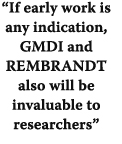 |

New Tools in the Fight Against Brain Tumors
This week's lead story discusses two studies that provide important advances in the treatment of glioblastoma, the most common form of brain tumor in adults. In one of the studies, the activation status of a specific gene is shown to correlate with response to the combination of temozolomide and radiotherapy.
 As this study shows, researchers are amassing a large library of molecular and genetic data. What's lacking are broader efforts to collect and channel these data into a single, comprehensive resource. One effort to fill this breach is the Glioma Molecular Diagnostic Initiative (GMDI), a study launched last year by the Neuro-Oncology Branch, jointly led by NCI and the National Institute of Neurological Disorders and Stroke. GMDI-derived data will be available in a publicly accessible database known as REMBRANDT, a component of the cancer Biomedical Informatics Grid (caBIG). GMDI includes a retrospective study of about 300 glioma tumor specimens and a 1,000- to 1,500-patient prospective study involving two NCI-funded brain tumor consortia and other NCI-funded institutions. Patients in the prospective study will have samples of their surgically-removed tumors sent to NCI for genetic and molecular analyses; findings will be correlated with each patient's clinical course. REMBRANDT also will house molecular and genetic data on all brain tumor types. As this study shows, researchers are amassing a large library of molecular and genetic data. What's lacking are broader efforts to collect and channel these data into a single, comprehensive resource. One effort to fill this breach is the Glioma Molecular Diagnostic Initiative (GMDI), a study launched last year by the Neuro-Oncology Branch, jointly led by NCI and the National Institute of Neurological Disorders and Stroke. GMDI-derived data will be available in a publicly accessible database known as REMBRANDT, a component of the cancer Biomedical Informatics Grid (caBIG). GMDI includes a retrospective study of about 300 glioma tumor specimens and a 1,000- to 1,500-patient prospective study involving two NCI-funded brain tumor consortia and other NCI-funded institutions. Patients in the prospective study will have samples of their surgically-removed tumors sent to NCI for genetic and molecular analyses; findings will be correlated with each patient's clinical course. REMBRANDT also will house molecular and genetic data on all brain tumor types.
The current classification system for brain tumors does not account for the recent genetic analyses that indicate that there are likely many types of gliomas. As a result, the system is not consistently predictive of prognosis or response to therapies. GMDI and REMBRANDT can help change that. Specifically, the data from the prospective GMDI study will help to validate the biologic models built from the molecular and genetic data collected from tumor specimens in the retrospective study. With REMBRANDT, we should be able to build a data-rich, molecular database that can produce a clinically significant biological classification system for all types of gliomas.
As Dr. Howard Fine, chief of NCI's Neuro-Oncology Branch, explains, REMBRANDT will integrate diverse data sets, including SNP array, expression array, proteomics, and clinical data. With such data available, less sophisticated users, such as clinicians, can get concrete answers to important clinical questions, allowing them to make more logical treatment decisions.
If early work is any indication, GMDI and REMBRANDT also will be invaluable to researchers. Scientists in the NCI Neuro-Oncology Laboratory, for instance, using data from the retrospective component of GMDI, were able to identify the protein HDAC1 as a key player in the sensitivity of a rare form of glioma, oligodendroglioma, to chemotherapy. Further lab experiments showed that downregulation of HDAC1 improved oligodendroglioma tumor cells' sensitivity to chemo. Dr. Fine's team took this information to the Cancer Therapy Evaluation Program, and two phase I and II trials testing two HDAC inhibitors in patients with recurrent gliomas are now underway. Many of the patients being accrued to these trials are part of GMDI.
The GMDI/REMBRANDT initiative encapsulates much of what we are trying to accomplish at NCI. It's fueled by advances in technology and an understanding of cancer's biology. More important, it's a collaborative effort that relies on intramural and extramural researchers, NCI-funded consortia, and multiple National Insitutes of Health institutes. It's both a model and a vital part of our advancement toward the 2015 goal.
Dr. Andrew C. von Eschenbach
Director, National Cancer Institute
|